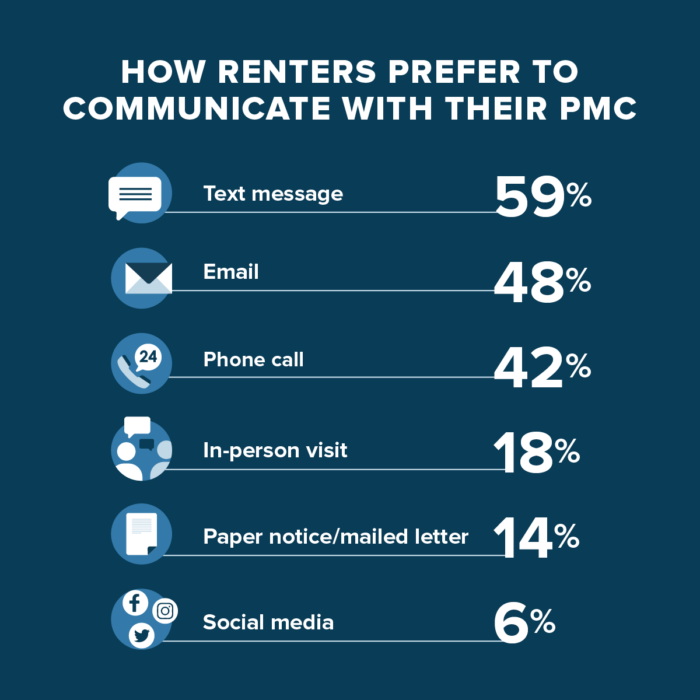Over the last few years, there’s been a sea change in renters’ level of comfort with technology across all age groups, which is evident in Buildium’s annual surveys of thousands of renters.
What Attracts Renters to Small Multifamily Properties, and What Keeps Them from Moving Out
Renters shared why they're considering moving out of their multifamily properties—and what it takes to keep them happy.
Get the GuideAs of 2023, 90% of renters are interested in completing rental processes online, ranging from 72% of the oldest renters we survey to a full 96% of the youngest renters. It’s clear that online payments, communications, and maintenance requests have become critical to providing a fantastic resident experience.
But this doesn’t mean that every resident interaction should be automated. Particularly for smaller property management companies, person-to-person interactions provide the perfect opportunity to create memorable experiences for residents that differentiate them from the competition.
To put this another way: Technology works best when it’s used to automate repetitive processes to make time for areas where a human touch can make a real difference.
What does this mean when it comes to communication? It might mean blending automated messages with more personal interactions when the time is right. But which interactions will benefit the most from an infusion of person-to-person communication? That’s what we’ll cover in this post.
How Do Renters Want to Hear From Their Property Manager?
First, let’s talk about how renters want to communicate with their property manager.
We’ve seen a surprising shift in renters’ communication preferences over the last two years. Since 2022 alone, the number of renters who want to communicate digitally with their property management company has increased by 8 percentage points. But when it comes to the specific communication method they choose, their preferences have changed.
59% of renters are now open to communicating with their property manager via text message—an increase of 22 percentage points since 2021. And this varies little by age: Texting is strongly preferred by Generation Z, Millennials, and Generation X, and is preferred by Baby Boomers as well, though by a smaller margin.
Just under half of renters say that email remains a good way to get in touch with them. But you might be surprised to hear that nearly as many renters say that they wouldn’t mind communicating with you via phone call—and this number is on the rise.

What’s behind this shift? As so many aspects of our day-to-day lives have moved online, we’ve all experienced a deluge of communications from all sides—from family and friends to the companies we interact with. This means that important messages are at risk of getting lost in the shuffle.
For property managers, this increases the importance of finding out how your renters prefer to communicate—both how they prefer to get in touch with you, and how they would prefer to receive information. (Though of course, an effective communication strategy will balance the methods your customers prefer with those that allow your team to operate efficiently and effectively.) We’ll get into more detail about this in the next section.
How to Communicate with Your Residents More Effectively, According to Renters
When we ask renters what a property manager could do to ensure their needs are met, better communication is among the most prominent themes that emerges in our renters’ surveys year after year.
Here are eight pieces of advice that renters identified as critical to their experience in their rental, ultimately influencing their decision of whether or not to renew their lease.
1. Ask about their communication preferences.
The lease signing process provides a natural opportunity to ask how your residents would prefer to hear from you. Whether they’re signing a new lease or renewing for another year, take the opportunity to get a sense of which communication methods are the lowest common denominator for a majority of your residents. Also, keep an eye on how their preferences change over time—for example, the shift we’ve noticed from email to texting.
And be sure to keep the lines of communication open even after the lease is signed. As one renter recommended, “Be attentive to your renters! I feel like so much focus is made during the initial signing of [the] lease, but relationships sour because of a lack of communication.”
2. Give them access to a resident portal.
When it comes to the technology that your property management company provides, renters were clear on what they’re looking for. One renter put it: “Definitely put [in the] time to make a great portal experience for your renters.”
Why is resident portal access so important to today’s residents? One renter explained, “I always worry my bank won’t get the check through the mail on time, and it can feel like you’re bothering somebody to text maintenance requests. If you manage more than a couple units, invest in an online portal for electronic payments and maintenance requests.”
Another renter told us that they appreciate having a single source of truth, saying: “A website that compiles all the necessary information and messages to refer back to would be helpful.”
3. Be reachable during the hours when they’re at home.
Many property management offices are open during the hours when their residents are most likely to be at work. Renters told us that they would appreciate knowing there was someone available to take their questions outside of standard business hours. As one renter requested, “Have someone available to communicate with after hours/on weekends.”
Another renter suggested, “Please have a split shift [at] the office so someone can address needs after 5 [PM]. Even with all the technology which reduces contact, sometimes we still need help from a person.”
This is especially true when it comes to emergency maintenance issues. Consider providing access to a maintenance contact center that can assist with repairs outside of standard business hours, benefiting both your residents and your team.
4. Clearly communicate your expectations.
A common source of frustration for renters are guidelines that are unclear, incomplete, or inconsistently enforced. From move-in to move-out, make sure that you accurately convey your expectations, and make it easy for renters to find important information on their own through a resident portal.
For example, one renter suggested, “Be clear, concise, timely, and straightforward in all communications. Also, have detailed instructions for when residents move in so that they don’t bother other residents.”
Another renter asked that their property manager “provide advance notice on intentions to renew, and provide guidelines at move-in for what damage they deem normal wear and tear. If inspections are performed, provide guidelines for what they are looking for.”
5. Acknowledge their concerns and offer transparency.
Renters told us that having a property manager who’s open to their feedback is a key component of their rental experience. Even when action can’t be taken immediately, they appreciate having their concerns listened to and acknowledged. As one renter put it, “Be as upfront and honest as possible. Be open to questions, and most importantly, be open to your renters’ wants and needs.”
This is especially true as it relates to maintenance and repairs, where it’s important to communicate what they can expect from your team in response to their concerns. One renter suggested, “Be open about maintenance delays and send updates when things are going on behind the scenes. That way, the renter won’t think you’ve forgotten them if the maintenance takes longer than expected.”
6. Give advance notice of upcoming work, and offer flexibility.
When major maintenance work will be taking place within the property, renters told us they’d appreciate receiving as much advance notice as possible. One renter suggested, “Let renters know about changes or happenings that are occurring around the area so the renters can plan in advance, things like planned power outages.”
Residents also appreciate it if you can provide flexibility around when maintenance work will be completed, particularly if it’s taking place within their units. Another renter explained, “Allow scheduled repairs to be done on weekends or evenings. We work too, and [due to] COVID, a lot more of us are at home and can’t have noise [during the day].”
7. Proactively check in with them throughout the year.
Many renters told us that they would appreciate periodic check-ins from their property manager to see whether anything in the unit needs their attention, or if anything could be done to improve their overall experience.
One way to accomplish this is through periodic property inspections. For example, one renter suggested, “Be proactive. Come to the residence once a year to see what may need fixing or updating that the renter hasn’t brought up.”
This is particularly true among long-term renters, whose units may have experienced some wear and tear, but who might be hesitant to bring non-emergency repairs to your attention. As one renter put it: “Save some of your budget to show appreciation periodically to long-term, stable residents in the form of unit repainting, carpet replacement, [and] window washing. Those residents save you turnover costs.”
8. View each interaction as an opportunity.
Finally, one perspective shift with enormous potential to impact retention is to view each interaction with your residents as a chance to create a memorable experience.
Renters told us that empathy and professionalism go a long way when conversing with your team. One renter recommended, “Recognize that your renters are your clients. Provide quick, efficient, quality service when needs arise.”
And another summarized: “Hire and train very professional staff. Show appreciation to long-term tenants. And have clear communication with tenants.”
Some residents move out for reasons that are beyond property managers’ control. But when we asked renters which factors most influence their decision to stay or go, their responses pointed to something important: their perception of value in their current rental. This encompasses not only the price of their unit and the amenities provided, but also the quality of service they receive, and the attention paid to the condition of their property. By actively seeking to improve these aspects of the resident experience, property management companies can exert a significant influence on renters’ decision to stay put or move out.
Read more on Leasing

